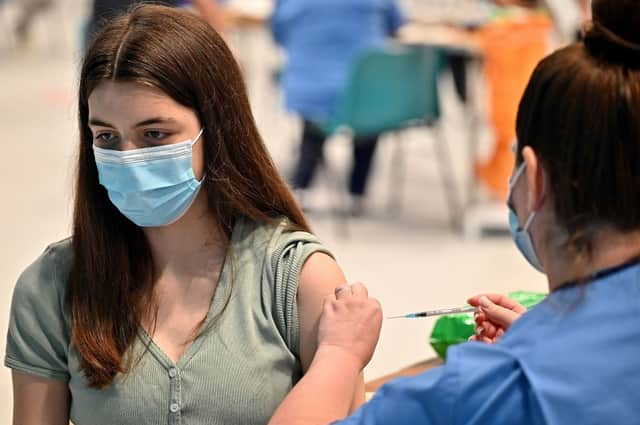Children aged 12 to 15 will need parental consent to get Covid jab


Parents of healthy 12 to 15-year-olds will be asked to give their consent if Covid-19 vaccines are approved for their children.
At the moment, only healthy teenagers over the age of 16 can get vaccinated and do not require permission to do so.
Decision on jabs yet to be made
Advertisement
Hide AdAdvertisement
Hide AdThe government is still deciding whether to offer the Covid-19 vaccine to healthy 12 to 15-year-olds, despite its own advisory body choosing not to endorse the policy.
The Joint Committee on Vaccination and Immunisation (JCVI) opted against backing the move on health grounds alone, as coronavirus presents such a low risk to younger teenagers.
However, Professor Chris Whitty and the UK’s three other chief medical officers are still reviewing the wider benefits of vaccinating this age group, such as minimising school absences, and are expected to present their findings within days.
Vaccines minister Nadhim Zahawi has denied not listening to the experts and said if the chief medical officers recommend vaccination then offering the jabs to youngsters is “absolutely” the right thing to do.
Advertisement
Hide AdAdvertisement
Hide AdWhile the government will wait for their advice before making a final decision, ministers have indicated they are keen to authorise a wider rollout.
Speaking on SkyNews, Mr Zahawi said: “We have not made any decisions, so we haven’t decided not to listen to the experts.
“On the contrary, all four ministers, the Secretary of State, Sajid Javid, and his fellow ministers in the devolved administrations have agreed to ask the chief medical officers to convene expert groups, including the JCVI being in that, to be able to recommend which way we should go on healthy 12 to 15-year-olds.”
Youngsters could override parents’ wishes
Mr Zahawi confirmed that parents of children aged 12 to 15 will be asked to give their consent in the event the jabs are approved for this age group, stating: “I can give that assurance, absolutely.”
Advertisement
Hide AdAdvertisement
Hide AdHowever, he later said that under 16s could override their parents’ wishes in some cases, if they are deemed “competent to make that decision, with all the information available”.
He told Times Radio: “What you essentially do is make sure that the clinicians discuss this with the parents, with the teenager, and if they are then deemed to be able to make a decision that is competent, then that decision will go in the favour of what the teenager decides to do.”
While the government is yet to announce its decision on vaccinating healthy 12 to 15-year-olds, on Friday (3 September) the JCVI did approve extending the jab programme to another 20,000 children in this age group who have underlying health conditions.
The advisory body stopped short of recommending the full rollout after investigating potential side-effects, such as the extremely rare events of inflammation of the heart muscle, known as myocarditis, after Pfizer or Moderna vaccinations.
Advertisement
Hide AdAdvertisement
Hide AdThe condition can result in short periods of hospital observation, followed by typically swift recoveries, but the JCVI concluded that the medium to long-term outcomes are still uncertain and more follow-up time is needed to get a clearer picture.
Professor Wei Shen Lim, the JCVI’s chairman of Covid-19 immunisation, said the group’s view is that the benefits of vaccinating the age group “are marginally greater than the potential harms”.
However, the benefits are “too small” to support a universal rollout at this stage.
Professor Peter Openshaw, a member of the New and Emerging Respiratory Virus Threats Advisory Group (Nervtag) which advises the government, said he was “a little surprised” at the JCVI’s decision, adding that he suspects most teens would be in favour of getting the vaccine.
Advertisement
Hide AdAdvertisement
Hide AdHe told BBC Breakfast: “To my mind, the public health benefit is very, very important, and we have to take the wider view that, unless we do get infection rates down amongst this particular part of the population, it will be very, very hard to prevent further large recurrences (of Covid-19).
“I would say that teenagers are often amongst the most altruistic and the most generous people in society.
“They often think very deeply about these moral and ethical issues and they want to protect others as well.
“So I would think that a lot of teenagers, actually, if they see the evidence in the round, would prefer to be vaccinated.”
This article orignally appeared on our sister site, NationalWorld.